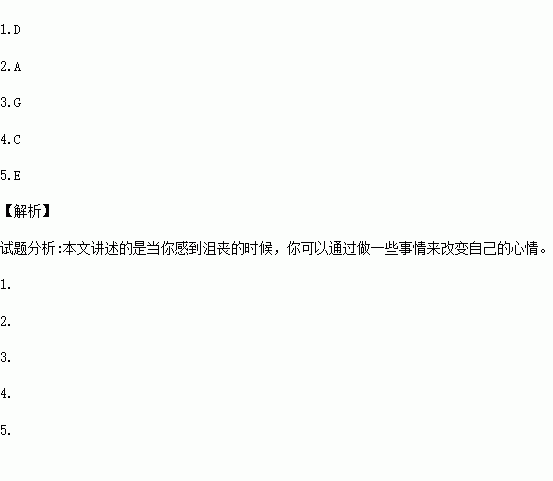题目内容
根据短文内容,从短文后的选项中选出能填入空白处的最佳选项,并在答题卡上将该项涂黑。选项中有两项为多余选项。
Things to Do When You’re Feeling Down
Let’s start with a fact. We all have days when we feel down and discouraged. 1. Here is a list to help you get back on track.
1. Take Care of Yourself
This may seem like an obvious thing, but try your best to get a good night’s sleep and eat healthy food when you’re hungry. 2. Consider setting an earlier bedtime than usual and stick to it. Make some nourishing snacks that you can easily grab instead of sugary junk food. Fresh fruit, a piece of cheese, some cut-up vegetables, homemade soup; they’re all quick and easy options to consider.
2. What’s Comforting to You?
3. Take a bike ride or go for a walk in nature. Treat yourself to a lunch at your favorite restaurant. Listen to some good music. Call a friend. Watch a funny movie. Take a nap. Read a good book. The release from stress will add to your level of happiness.
3. Make an Action Plan
Can you identify what’s making you unhappy? If so, you have a good chance of changing it. 4. You don’t have to figure out a whole plan to solve your conflicts; simply taking some steps in the right direction will boost your good feeling.
4. This, Too, Shall Pass
What do you say to yourself when you’re going through a tough time? Beating yourself up is not helpful! 5. Examples are, “It is what it is; let me just accept it and move on.’’ “All I can do is put one foot in front of the other and keep moving.” And finally, “This, too, shall pass.”
A. Science shows that both of these things can have a huge positive impact on both your mood and your blood sugar
B. A lot of researches show that when we intend to be happy, our thoughts and actions follow suit.
C. What action can you take today that will make you feel better and change the pattern?
D. What can you do to pull yourself back from despair?
E. Try saying things that are relieving to your hearts and mind.
F. Other times, the blues just seem to hit for no reason at all.
G. If you’re going through a tough time, think about some healthy comforts that will make you feel better.
 小学生10分钟口算测试100分系列答案
小学生10分钟口算测试100分系列答案
